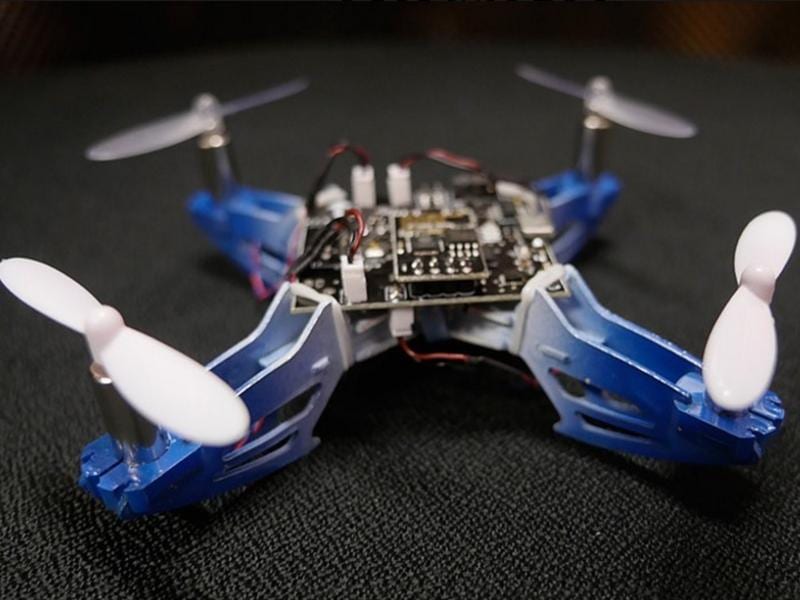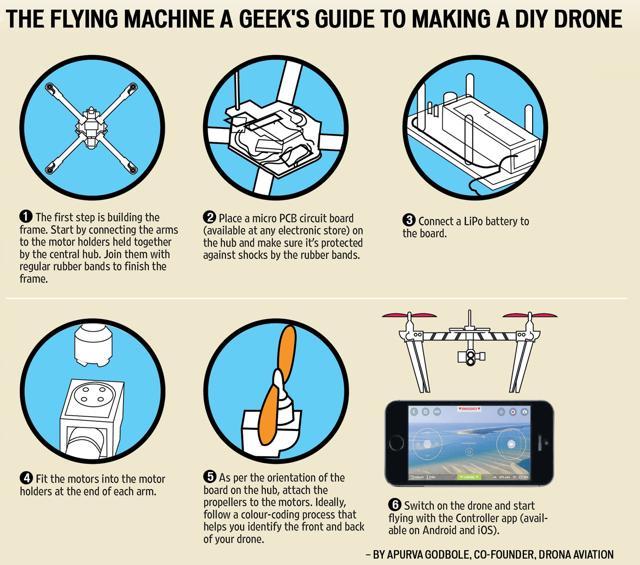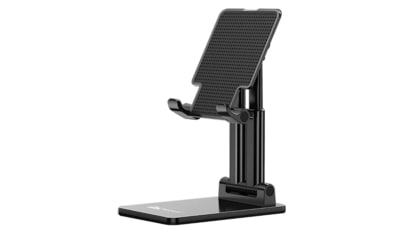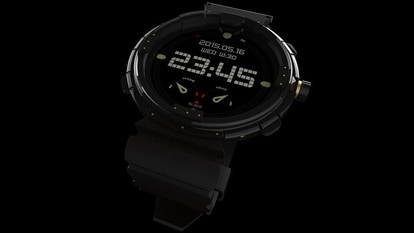Want to build a drone from scratch? Here’s how
Build yourself a drone this weekend. But don’t fly it out on the streets just yet

In 2013, Apurva Godbole purchased a drone for ₹45,000. Additionally, he spent about ₹35,000 on buying a lightweight camera that could be mounted on his drone. "It was a lot of money but the excitement of owning an actual drone was overwhelming," says Godbole.
From the moment he bought it, he spent all his time experimenting with it. But after just six days, Godbole lost his super-expensive toy to a gush of strong wind. "The connection between the drone and my remote control failed. The drone literally flew away. I never found it; I never even tried to find out what happened. The guilt of having spent so much money was too much. I was depressed for the next couple of weeks about the loss," he recalls.
It was then that Godbole realised the need to develop sustainable drones — drones that don't cost much, let new users experiment and could withstand the damage that might be caused due to accidental crashes.


In November 2014, Godbole co-founded Drona Aviation, a robotics company that designs and develops products and services in the aerospace domain, at IIT Mumbai, Powai. Most recently, Drona launched a DIY nano drone, called Pluto in an effort to make drone flying more accessible.
Now, in collaboration with Maker's Asylum — a community workshop space in Andheri — Godbole will conduct a DIY drone making workshop this weekend.
The assembly
"Drones were first introduced to India in 2012, when Israeli makers collaborated with the Ministry of Defence Government of India to incorporate drones in the surveillance infrastructure of our country. They were mostly high-end, military-equipped drones not meant for civilian use," says Godbole.
However, sensing the cinematic advantage of having unmanned airborne cameras, it was the wedding filming industry that soon incorporated drones in their equipment. They have, since, helped boost the market share for drones worldwide. "Today, the global net worth of the drone industry is $200 billion (₹3,000 crore approx), and about 60 per cent of it is owned by the wedding filmers (source: Business Standard)," says Godbole.
It is not surprising then that in the last four years, events such as the Indian Premier League and even the ICC World Twenty20 (2016) incorporated drones as part of their primary filming apparatus.
Worldwide, however, drones are not limited only to the entertainment and defence; they are being introduced to sectors such as agriculture and disaster relief as well. "Drones have slowly revolutionised vast farmland surveillance. With high-tech cameras mounted on these drones, farmers can keep track of their harvest and study their plantations to make the necessary changes in their preservatives," says Allan Rodrigues, a collaborator at the Asylum.


But with an upmarket, durable series of drone machines priced between ₹45,000 to ₹60 lakh, how will Indian farmers cope? Of course, at the moment, drones in the agricultural industry will be accessible only to the rich farmers. But Godbole is almost certain that things will change over the next five years. "The idea is to make the technology and services available to consumers at a cheaper price. We are already manufacturing drones like Pluto that are easy to assemble and fly, crash resistant and, most importantly, highly affordable," he says.
Legal battles
Despite the speed at which the drone-making industry has evolved since 2012, they still face a major hurdle in achieving full access to the market: a legal blanket ban. And though one is allowed to fly a drone for the purpose of shooting a film or on their private property as a hobby, the use of drones is a criminal offence as stated by the Directorate General of Civil Aviation (DGCA) and Mumbai Police.


The ban was first imposed in July 2015, in light of a drone pizza delivery initiative by Mumbai-based Francesco Pizzeria Restaurant, Lower Parel. The restaurant flew the unmanned aviation apparatus complete with a pizza box to Worli in under 10 minutes.
"The incident brought to light the possibility of a misuse of drones by terrorists. In a way, the ban has come as a boon. This way, a serious conversation regarding the regulated use of drones for public service is a possibility," says Rodrigues.
But won't the regulation also limit the growth of the industry? Rodrigues disagrees. "Without a written law, we will have Chinese drones taking over our markets in no time. Regulations will benefit the Indian manufacturers and give makers a chance to actually create a self-sustaining drone industry," he says.


Godbole, on the other hand, believes that the reason behind the legal trouble is primarily the fear of the unknown. "The drone industry is limited by human imagination. We are currently consuming only 10 to 20 per cent of the entire range of possible applications of a drone. As a result its misuse poses a problem. But in the next three to four years, when laws or regulations come into play and are exercised, the sky is the limit," says Godbole.
Lift off
The Drone Making Workshop will be conducted on May 21, 11am to 8pm
Where: Maker's Asylum, D-11/1, opposite Passport Seva Kendra, Marol Industrial Area, Andheri (E)
Call: 90046 86828
Price: ₹1,500 per head
Register on: makersasylum.com
Catch all the Latest Tech News, Mobile News, Laptop News, Gaming news, Wearables News , How To News, also keep up with us on Whatsapp channel,Twitter, Facebook, Google News, and Instagram. For our latest videos, subscribe to our YouTube channel.


























